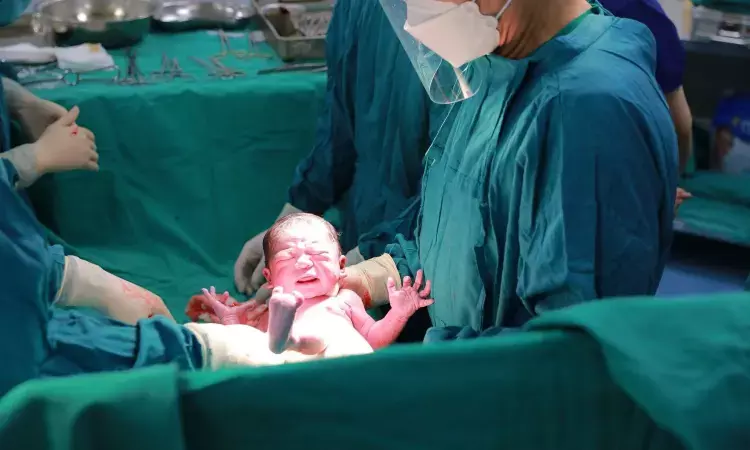- Home
- Medical news & Guidelines
- Anesthesiology
- Cardiology and CTVS
- Critical Care
- Dentistry
- Dermatology
- Diabetes and Endocrinology
- ENT
- Gastroenterology
- Medicine
- Nephrology
- Neurology
- Obstretics-Gynaecology
- Oncology
- Ophthalmology
- Orthopaedics
- Pediatrics-Neonatology
- Psychiatry
- Pulmonology
- Radiology
- Surgery
- Urology
- Laboratory Medicine
- Diet
- Nursing
- Paramedical
- Physiotherapy
- Health news
- Fact Check
- Bone Health Fact Check
- Brain Health Fact Check
- Cancer Related Fact Check
- Child Care Fact Check
- Dental and oral health fact check
- Diabetes and metabolic health fact check
- Diet and Nutrition Fact Check
- Eye and ENT Care Fact Check
- Fitness fact check
- Gut health fact check
- Heart health fact check
- Kidney health fact check
- Medical education fact check
- Men's health fact check
- Respiratory fact check
- Skin and hair care fact check
- Vaccine and Immunization fact check
- Women's health fact check
- AYUSH
- State News
- Andaman and Nicobar Islands
- Andhra Pradesh
- Arunachal Pradesh
- Assam
- Bihar
- Chandigarh
- Chattisgarh
- Dadra and Nagar Haveli
- Daman and Diu
- Delhi
- Goa
- Gujarat
- Haryana
- Himachal Pradesh
- Jammu & Kashmir
- Jharkhand
- Karnataka
- Kerala
- Ladakh
- Lakshadweep
- Madhya Pradesh
- Maharashtra
- Manipur
- Meghalaya
- Mizoram
- Nagaland
- Odisha
- Puducherry
- Punjab
- Rajasthan
- Sikkim
- Tamil Nadu
- Telangana
- Tripura
- Uttar Pradesh
- Uttrakhand
- West Bengal
- Medical Education
- Industry
Ventilatory assistance before umbilical cord clamping fails to improve outcomes for extremely preterm infants: JAMA

USA: In a groundbreaking development in neonatal care, a randomized clinical trial (RCT) has demonstrated the significant benefits of providing ventilatory assistance to extremely preterm infants before umbilical cord clamping. The trial has garnered attention for its potential to revolutionize caring for these vulnerable newborns.
In the randomized clinical trial of 570 infants born at less than 29 weeks gestation published in JAMA Network Open, the researchers found no reduction in intraventricular hemorrhage (IVH) or death with assisting ventilation before cord clamping versus cord clamping followed by standard resuscitation.
"No difference was detected in the primary outcome of IVH on 7- to 10-day head ultrasonography or death before day 7," the researchers reported.
For extremely preterm infants, it is suggested that providing assisted ventilation during delayed umbilical cord clamping may improve outcomes. Considering this, Karen D. Fairchild, Division of Neonatology, Department of Pediatrics, University of Virginia, Charlottesville, and colleagues aimed to investigate whether assisted ventilation in extremely preterm infants (23 0/7 to 28 6/7 weeks’ gestational age) followed by cord clamping reduces IVH or early death.
For this purpose, the researchers conducted a phase 3, 1:1, parallel-stratified RCT at 12 perinatal centers across the US and Canada from 2016 to 2023. It assessed early death and IVH outcomes of extremely preterm infants randomized to receive 120 seconds of assisted ventilation followed by cord clamping versus delayed cord clamping for 30 to 60 seconds with ventilatory assistance afterward.
Two analysis cohorts, breathing well and not breathing well, were specified a priori based on an assessment of breathing 30 seconds after birth.
If needed, all infants received stimulation and suctioning after birth. From 30 to 120 seconds, infants randomized to the intervention received positive-pressure ventilation if not breathing well or continuous positive airway pressure (CPAP) if breathing well, with cord clamping at 120 seconds. Control infants were given 30 to 60 seconds of delayed cord clamping followed by standard resuscitation.
The primary outcome was any grade intraventricular hemorrhage on head ultrasonography or death before day 7.
The study led to the following findings:
- Of 1110 women consented to participate, 548 were randomized and delivered infants at GA in less than 29 weeks.
- Five hundred seventy eligible infants were enrolled (median GA, 26.6 weeks; 52.1% males).
- Intraventricular hemorrhage or death occurred in 34.9% of infants in the intervention group and 32.5% in the control group (adjusted RR, 1.02).
- In the prespecified not-breathing-well cohort (47.5%; median GA, 26.0 weeks; 56.1% males), IVH or death occurred in 38.7% of infants in the intervention group and 43.0% in the control group (RR, 0.91).
- There was no evidence of differences in severe brain injury, death, or major morbidities between the intervention and control groups in either breathing cohort.
The study did not demonstrate that providing assisted ventilation before cord clamping in extremely preterm infants reduces early death or IVH.
"Additional study around safety, feasibility, and efficacy of assisted ventilation before cord clamping may provide additional insight," the researchers concluded.
Reference:
Fairchild KD, Petroni GR, Varhegyi NE, et al. Ventilatory Assistance Before Umbilical Cord Clamping in Extremely Preterm Infants: A Randomized Clinical Trial. JAMA Netw Open. 2024;7(5):e2411140. doi:10.1001/jamanetworkopen.2024.11140
Dr Kamal Kant Kohli-MBBS, DTCD- a chest specialist with more than 30 years of practice and a flair for writing clinical articles, Dr Kamal Kant Kohli joined Medical Dialogues as a Chief Editor of Medical News. Besides writing articles, as an editor, he proofreads and verifies all the medical content published on Medical Dialogues including those coming from journals, studies,medical conferences,guidelines etc. Email: drkohli@medicaldialogues.in. Contact no. 011-43720751


